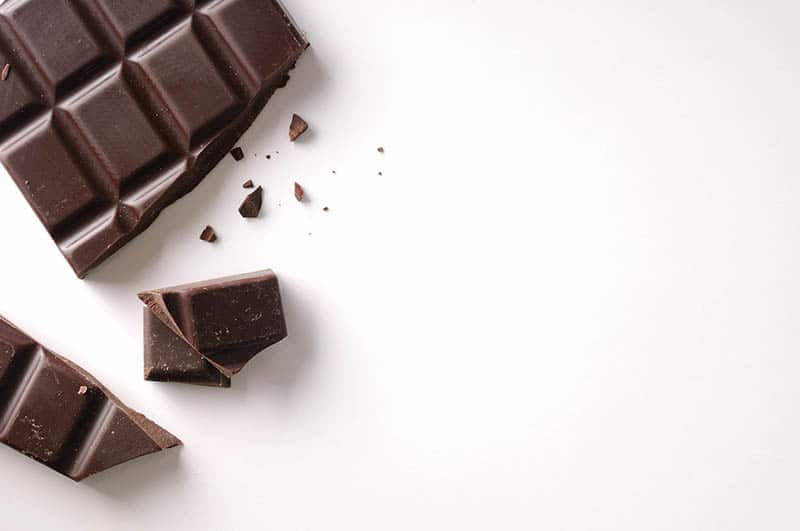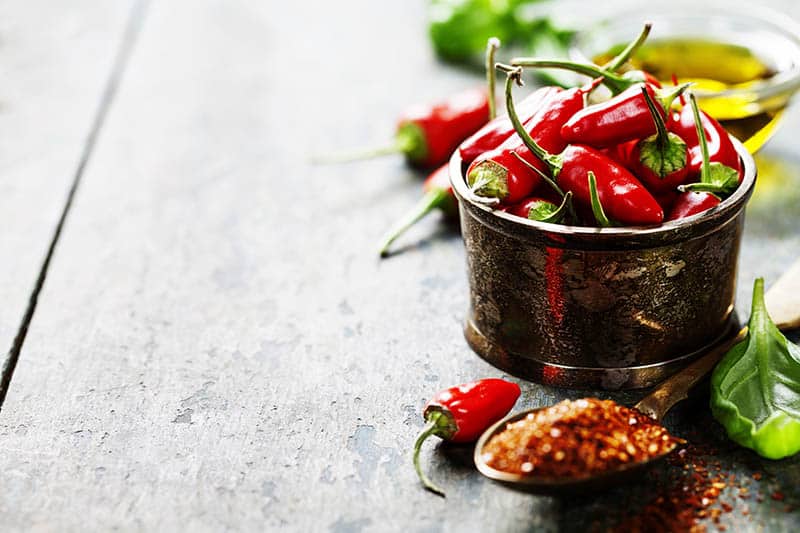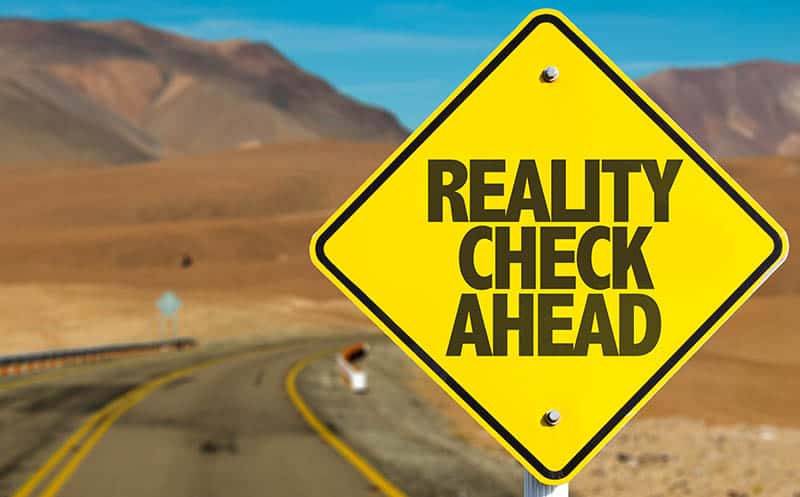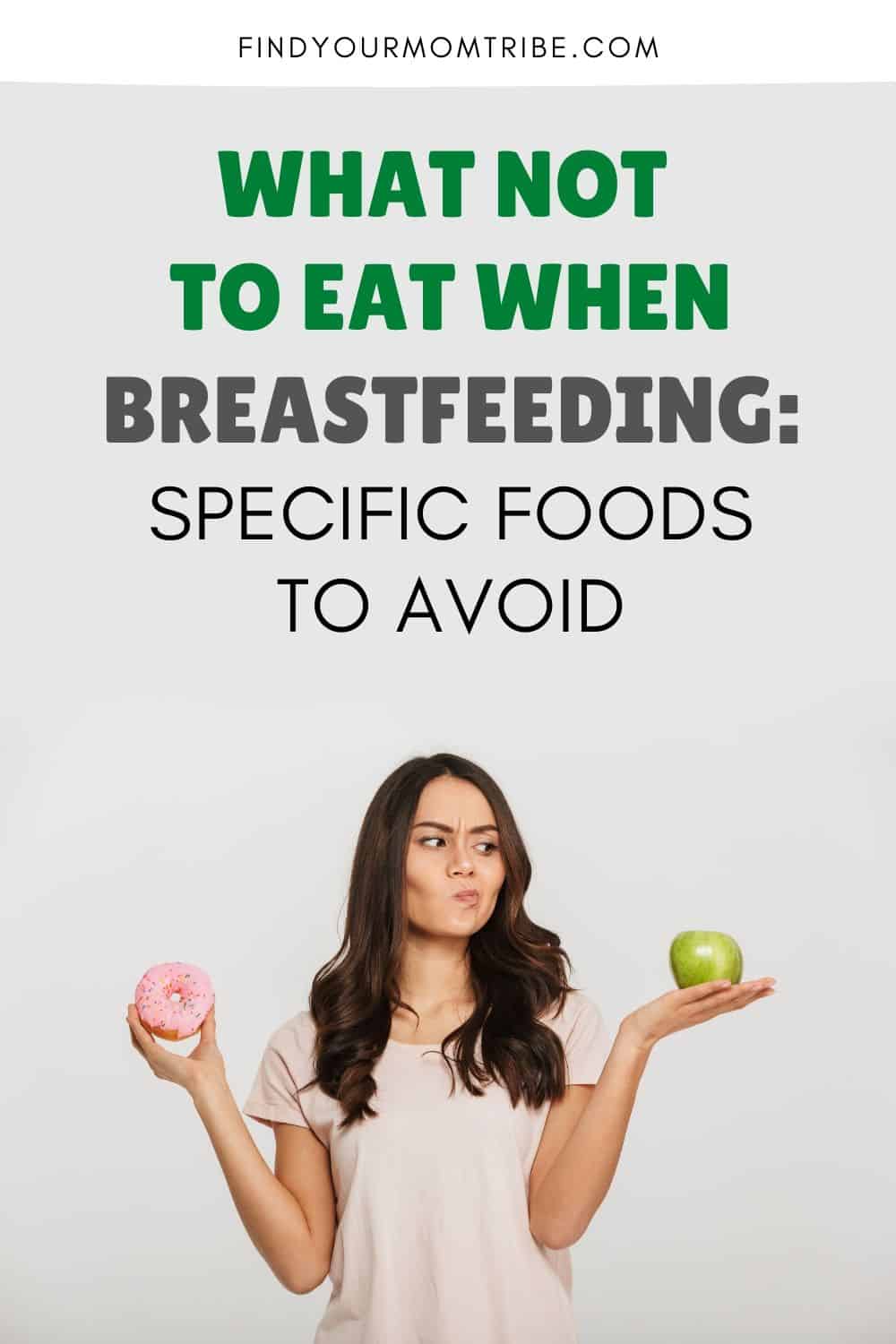There’s plenty of information on what foods to steer clear of when you’re pregnant – be it from online resources, what-to-expect books, or your own mother dearest – but as for what not to eat when breastfeeding, there’s just as much hearsay and conflicting info out there.
Just as expectant mothers need a balanced diet, so do nursing moms.
There are particular foods that serve both you and baby well while breastfeeding, but also specific foods that a breastfeeding mother’s diet should not include for various reasons, such as nutritional intake, food allergies, colic and fussiness in baby, and lactation issues.
So, without further ado, let’s get straight to what you came here to find out, shall we?
Foods To Avoid When Breastfeeding
1. Certain Seafood

In fact, the Environmental Protection Agency (EPA) and Food and Drug Administration (FDA) say it’s a good idea to include various fish and shellfish in your family’s diet (and especially for women and young kids), as it can help to keep hearts healthy and aid proper development and growth in children.
That said, there’s trace amounts of mercury in almost all seafood, which fortunately isn’t really a health risk for most.
However, the high mercury levels in some seafood could harm the developing nervous system of a fetus and young child.
The FDA and EPA therefore advise that pregnant women, breastfeeding moms, and young children avoid certain types of fish, only eating those that are low in mercury.
Most common high-mercury seafood to AVOID:
- Bluefish
- Grouper
- King Mackerel
- Mackerel (Spanish, Gulf)
- Marlin
- Swordfish
- Shark
- Sea Bass (Chilean)
- Tilefish
- Tuna (canned Albacore, Yellowfin, Bigeye, Ahi)
Low-mercury seafood that is SAFE to eat while breastfeeding:
It’s considered safe to eat two servings a week (up to 6 oz each) of these fish, crustaceans, and mollusks – provided that they are reliably sourced, free from contaminants, and thoroughly cooked:
- Fish – Anchovies, Catfish, Flounder, Haddock, Hake, Herring, Mackerel (North Atlantic, Chub), Salmon, Sardine, Sole, Squid, Tilapia, Trout, Whitefish
- Shellfish – Clam, Crab, Crayfish, Scallop, Shrimp
Side note: If you’re vegan or vegetarian, yet still want the amazing benefits of the omega-3 fatty acid DHA, then algae oil is a great option.
2. Alcohol

Do remember, however, that alcohol passes via breastmilk into your baby’s body.
The hard rule to follow is if you feel at all tipsy or drunk, you should refrain from breastfeeding until all alcohol has cleared from your body before resuming nursing.
Although the effects of alcohol differs from one person to the next, according to the American Academy of Pediatrics (AAP), the general consensus is it’s safe to breastfeed after consuming one standard alcoholic beverage; for example, a 5-ounce glass of wine, 12 ounces of beer, or 1 shot of distilled spirits.
Try to only have that drink after nursing your little one, then wait for 2-3 hours before resuming.
Alternatively, you can prepare ahead of time and express your milk before drinking alcohol.
3. Caffeinated Beverages

I’m not going to burst your bubble and say it’s totally off the cards, BUT be careful with your caffeine intake – don’t go overboard and drink 6 cups of coffee to make it through the day!
Coffee, many teas, and energy drinks contain caffeine, which will end up in mom’s breast milk.
This may make sleepy-time difficult for not only you, but your little one too.
It’s important to note that a baby’s body does not process caffeine as efficiently as an adult’s, and it can very quickly disrupt your wee one’s sleep schedule.
Signs that your little one suffers from caffeine stimulation include insomnia, fussiness, and a rapid heart rate. (And can you just imagine the vicious cycle of caffeine and sleep deprivation!?)
Also, there have been studies that have found that coffee, tea, and other caffeinated drinks make it harder for the body to absorb iron – a crucial nutrient needed for energy.
For instance, results from one study showed one cup of coffee with a burger meal reduced iron absorption by over a third, and with the same meal, tea inhibited nearly two-thirds.
And the stronger your caffeinated beverage, the less iron you absorb. The biggest influencer, however, is shown to be when you consume it.
So if you simply cannot do without a cuppa joe or iced tea, your body’s ability to absorb iron won’t be affected if you drink it one hour before having a meal (particularly food that’s rich in iron, e.g. meat, leafy greens, and breakfast cereals).
4. Chocolate

The good news is it’s fine to have a slice of cake or a block of chocolate every now and then.
However, if you overindulge in it, your baby will be affected in the same manner as with caffeine due to the stimulant theobromine that’s found in chocolate (in addition to the caffeine).
If you’re really craving some chocolatey goodness, then your order of preference in terms of theobromine content would be white chocolate (none), milk chocolate (moderate) and then dark chocolate (the highest amount of theobromine).
5. Spicy Foods

While some breastfeeding women report that their babies turn away from the breast after having eaten a spicy or garlicky meal, others say that their little ones actually stay on the breast longer because of the new, exciting breast milk flavor.
Generally speaking, if your diet consisted of strong, spicy foods such as chilies and garlic while pregnant, these would have been in your amniotic fluid, so your baby would have tasted these before birth.
It makes sense, then, that when they “re-taste” those flavors in your mother’s milk, they are already used to them.
6. “Gassy” Veggies

It may turn out to be completely okay, but it could also possibly cause a colicky infant to become even more miserable.
Here are a list of vegetables that could cause gassiness and bloating in your already colicky baby:
- Crucifers, e.g. brussels sprout, cabbage, broccoli, cauliflower, kale, bok choy, radish, kale, collard greens, kohlrabi, rutabaga, watercress
- Legumes, e.g. beans, peas, lentils
Alanna Levine, M.D, advises that if you’re unsure and your little one really seems gassy, try eliminating a particular food for a week or two and monitor your infant’s symptoms to see if there’s any difference.
If there is improvement, only for it to get worse again when resume eating that specific food, you’ve probably found your culprit.
7. Allergenic Foods

Foods that commonly cause allergies, such as peanuts, tree nuts, dairy, eggs, and gluten are not prohibited per se, but should be treated on a case-by-case basis.
Unfortunately there’s nothing you can include or avoid in your diet as a breastfeeding mother to prevent your child from developing an allergy.
While it’s true that by cutting specific foods from your diet, you might lessen the risk of eczema in your baby, be sure to first consult your healthcare provider before making any dietary changes.
That said, let’s have a look at the two most commonly reported food allergens.
Peanuts

But what if you are not allergic to peanuts, for instance, but are scared that your little one may develop a sensitivity to peanuts if you eat them while breastfeeding?
Well, there’s good news and bad news. The good news is that you may in fact eat peanut-based foods while breastfeeding.
Bad news? It comes with a caveat: You should be sure to also get your baby to eat it herself (as soon as she’s eating solids, of course), otherwise the risk is higher that your baby will develop a peanut allergy.
Evidence from studies shows that if you consume peanuts while nursing and introduce them directly to your infant’s diet within her first year, she is less likely to develop a peanut allergy.
Conversely, if you eat peanuts while breastfeeding but delay introducing peanuts to your baby past the recommended 12 months, or if you avoid peanuts yourself but directly introduce peanuts by 12 months, the risk of your child developing a peanut allergy increases significantly.
Cow’s milk

If your breastfed baby is one of the rare sufferers of cow’s milk protein intolerance or allergy, it’s best to get your little one seen by her healthcare provider, who will likely advise strict avoidance in your diet.
In such a case, this would mean that you as a breastfeeding mom would need to exclude any food containing milk, milk products, whey, casein, or sodium caseinate.
Busting Some Myths

Truth: You’ve probably heard it a dozen times that sushi’s strictly off-limits while pregnant or breastfeeding because of the health risks associated with parasites and bacteria.
The truth is, sushi is totally permissible and even good for you, providing that you stick to eating fish that’s listed as safe (see above), follow the recommended portions, and make sure it comes from a reputable restaurant/supplier.
Myth 2: Drink dark beer to help the milk come in.
Truth: While it may do wonders for a nursing mom’s mental well-being and help her to relax (which in itself can help with letdown), the barley in beer has no effect on stimulating milk production.
Myth 3: Peppermint, parsley, and sage affects milk supply.
Truth: This is yet another old wives’ tale. There isn’t any published evidence to support that these three herbs can negatively affect your milk supply.
That said, sage in large amounts can be toxic for anyone, so keep it in moderation.
Myth 4: Being vegan or vegetarian will affect breastmilk quality.
Truth: If you follow a balanced, healthy diet with sufficient calories and all the nutrients your body needs (protein, carbs, fats, vitamins, minerals), you’re in the clear.
Just be sure, breastfeeding mamas, that you include foods and/or supplements that’ll provide you with plenty of vitamin B12, vitamin D, calcium, and omega-3 fatty acids.
If you follow a vegan or other specific diet, seek extra advice from your healthcare provider to ensure both you and your baby are getting all the essential nutrients needed.
Myth 5: It’s safe to breastfeed your baby if you “pump and dump” after drinking alcohol.
Truth: “Pumping and dumping does nothing: It removes the milk but the alcohol levels are still high in your blood,” states lactation consultant Andrea Syms-Brown, IBCLC, RLC.
She advises to wait until your blood is completely free of alcohol before nursing, which means that your breastmilk will be as well.
How to tell if your baby is allergic or intolerant to something in your breastmilk

Studies suggest there’s only just over 1% chance of a baby being allergic to something in mother’s milk.
That said, the more common culprits for an unhappy baby is food allergens (nuts, cow’s milk, soya, eggs, corn) found in a breastfeeding mom’s diet, rather than the hot sauce, garlic, chilies, or gassy veggies that moms often blame.
Signs and symptoms that your baby is allergic to something in your breastmilk:
- excessive vomiting;
- rash;
- blood in stools;
- persistent congestion.
On the other hand, if your baby has a food intolerance, the following symptoms will be observed:
- fussiness/crying after a feed;
- reflux;
- “explosive” diapers;
- baby brings knees up to chest.
Seek the advice of your pediatrician, home doctor, or dietitian if any of these symptoms crop up in your baby.
They may advise an elimination diet to establish the cause of your little one’s troubles.
It’s also a good idea to start keeping a food diary where you jot down what and when you’ve had something to drink and eat, and compare it to the symptoms in your baby.
Wrap Up
In general, the types of foods you eat while breastfeeding are important, but experts say it’s more important to focus on the amount of food you consume.
Lactating women need an additional 500 calories per day to maintain their milk supply.
That means if you usually eat around 2000 calories a day, shoot for 2500 and never fall below 1500.
According to registered dietitian and certified lactation consultant Catherine Brennan, malnutrition of mothers during breastfeeding does not necessarily change the production of breast milk, but can affect energy levels, mood, and overall well-being.
So, you heard it from Brennan, it’s crucial to eat right – and enough. So make sure to check our free printable 7-day breastfeeding meal plan!
Stay healthy, mamas!
References:
- US Food And Drug Administration, “FDA/EPA 2004 Advice on What You Need to Know About Mercury in Fish and Shellfish”, July 2, 2019.
- American Academy of Pediatrics, “Fetal Alcohol Syndrome, FAQ”.
- “Is it safe for a breastfeeding mom to eat beans and other gas-inducing foods?”, Alanna Levine, M.D, an article published on Baby Center site.
- National Library Of Medicine, “Reduced risk of peanut sensitization following exposure through breast-feeding and early peanut introduction”, Tracy J Pitt, Allan B Becker, Moira Chan-Yeung, Edmond S Chan, Wade T A Watson, Rishma Chooniedass 2, Meghan B Azad, 2017.
- Lindsey Shipley, RN, IBCLC, “Are There Foods to Avoid While Breastfeeding?“, an article published on The Bump website, updated July 2020.
- Andrea Syms-Brown, IBCLC, RLC, “Are There Foods to Avoid While Breastfeeding?“, an article published on The Bump website, updated July 2020.
- Catherine Brennan, “These are the types of food to eat and avoid while you’re breastfeeding, according to experts”, 2019.
READ NEXT:
- Lactogenic Food: Top 20 Ingredients For A Better Milk Supply
- Best Ever Lactation Cookie Bars for Boosting your Milk Supply
- Can Pregnant Women Eat Ceviche? Risks And Side-Effects Explained
Like this post? Please share or pin it for later. You can also stay in the loop and follow us on Facebook, Instagram and Pinterest.

This post contains affiliate links. Please see our full disclosure for more info.

